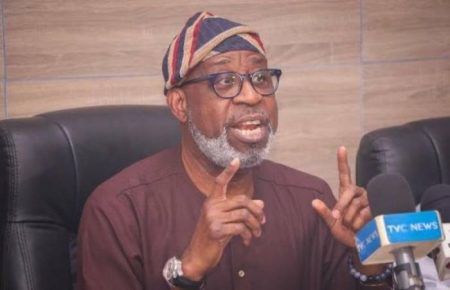Oscarline Onwuemenyi
11 August 2014, ABUJA – To ensure strict compliance to rules and regulations guiding mining operations in the country, the Federal Government has vowed to shut any mining and quarry firms that is not operating in accordance with the Nigerian Minerals and Metals Act of 2007, Mining Regulations and any other extant mining laws in the country.
The Minister of Mines and Steel Development, Arc, Musa Mohammed Sada disclosed this on while receiving the presentation of the year 2013 Annual Report and Audited Accounts of the Council of Nigeria Mining Engineers and Geoscientists (COMEG) from the Chairman of the council, Chief Chambers Oyibo who led other council members to the Ministry in Abuja.
Arc. Sada revealed that the government had recently revoked about six hundred mining licenses due to non-compliance with the relevant laws guiding mining operations in the country.
The Minister expressed his pleasure to receive these reports from COMEG, which he described as a strong institution that gives strength to the nation’s extractive industries.
Arc. Sada lauded the council for fulfilling the requirements of the law that established COMEG; he urged other agencies of government to emulate COMEG as this would go a long way in monitoring their activities in order to move forward.
While lauding the initiative of COMEG in relation to the issuance of practicing licenses to its financial members as well as capacity training, the Minister said the present administration had seen the need for human capital development as one of the requirements of Nigeria’s extractive industries in line with the Transformation Agenda of President Goodluck Jonathan.
The Minister noted that, “No matter how much mineral resources a country has, if it doesn’t have the right human skills, the country will not develop”, he said the country needs the right knowledge and idea for the minerals and metals sector to develop optimally.
He noted the level of preparedness of the present administration towards the development of regulatory bodies, noting that, various activities of COMEG are clear indications of a responsible regulatory body in the country.
The Minister assured the council of the Ministry’s support and assistance for it to move to the next level.
Earlier in his presentation, the Chairman of COMEG, Chief Chambers Oyibo said the presentation of the year 2013 Annual Report and Audited Accounts of COMEG is in compliance with the provision of COMEG Act part (11) Financial Provision, section 7(3) where the council is required by law to prepare and submit to the Minister, Annual Report and Audited Accounts of COMEG.
He enumerated among others achievements recorded by the council during the year 2013, including conducting a Stakeholders’ Workshop on Mapping of Fresh water Aquifers in Coastal Nigeria, and carrying out Monitoring and Evaluation of Professionals and Operators in Mining and Quarrying Firms in North West, South – West and North-Central Zones of the country.
He added, “COMEG has introduced Pre-Registration Examination for various categories of members seeking registration in order to set and maintain standards of education and practice. We have also carried out the Induction and Public Registration of three hundred and ninety four (394) members.”
Chief Oyibo explained that the monitoring and evaluation of mining professionals and operators in some geopolitical zones of the country was carried out to sensitize them on the need to register with COMEG, adding that, the exercise revealed that most mining companies have not registered with COMEG as a corporate body and do not have COMEG registered mining professionals in their employment to undertake mining operations.
He said the council had also commenced the issuance of practicing licenses to financial members in order to ensure compliance with the provisions of relevant laws and regulations of COMEG.
In his remarks, the Registrar of COMEG,Engr. Bello Bugaje said the council was striving hard to have a strong and virile COMEG, but it is being faced with a number of challenges such as lack of permanent office accommodation, insufficient and untimely release of funds from government among others that require immediate attention.




